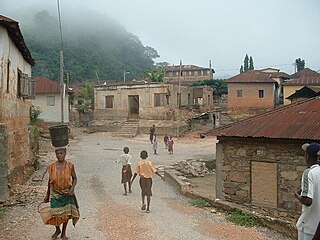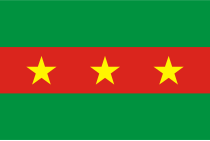
Ghana, officially the Republic of Ghana, is a country in West Africa. It abuts the Gulf of Guinea and the Atlantic Ocean to the south, sharing borders with Ivory Coast in the west, Burkina Faso in the north, and Togo in the east. Ghana covers an area of 239,567 km2 (92,497 sq mi), spanning diverse biomes that range from coastal savannas to tropical rainforests. With over 32 million inhabitants, Ghana is the second-most populous country in West Africa. The capital and largest city is Accra; other significant cities include Kumasi, Tamale, and Sekondi-Takoradi.

Keta is a coastal town in the Volta Region of Ghana. It is the capital of the Keta Municipal District.

The Anlo Ewe are a sub-group of the Ewe people of approximately 6 million people, inhabiting southern Togo, southern Benin, southwest Nigeria, and south-eastern parts of the Volta Region of Ghana; meanwhile, a majority of Ewe are located in the entire southern half of Togo and southwest Benin. They are a patrilineal society governed by a hierarchal, centralized authority. Their language is a dialect of the Ewe language, itself part of the Gbe language cluster. The Ewe religion is centered on the Supreme God, Mawu and several intermediate divinities. Christianity has been accepted in every part of Anlo Ewe land, with a minority of people still practicing traditional Vodun beliefs. The Vodu religion is slowly becoming a previous religion among the Anlo Ewes, with the youth of the community today practicing Christianity much more. However, those who still practice the Vodu religion also believe their tradition is a factor that keeps integrity and probit, while Christianity stands to pave way for integrity, honesty and probity to be washed away as years go by. It is for this reason that some Anlo Ewe people do away with Christianity when it comes to issues of accountability.

The Ewe people are a Gbe-speaking ethnic group. The largest population of Ewe people is in Ghana, and the second largest population is in Togo. They speak the Ewe language which belongs to the Gbe family of languages. They are related to other speakers of Gbe languages such as the Fon, Gen, Phla Phera, Gun, Maxi, and the Aja people of Togo and Benin.

Volta Region is one of Ghana's sixteen administrative regions, with Ho designated as its capital. It is located west of Republic of Togo and to the east of Lake Volta. Divided into 25 administrative districts, the region is multi-ethnic and multilingual, including groups such as the Ewe, the Guan, and the Akan peoples. The Guan peoples include the Lolobi, Likpe, Akpafu, Buem, and Nkonya people. This region was carved out of the Volta Region in December 2018 by the New Patriotic Party. The people of the Volta Region are popularly known as Ewes. The people of the Volta Region are popular known for their rich cultural display and music some of which include Agbadza, Borborbor and Zigi.
Akatsi is a small town and is the capital of Akatsi South District, a district in the Volta Region of Ghana.

Aflao is a town in Ketu South District in the Volta Region on Ghana's border with Togo. Aflao is the twenty-eighth most populous settlement in Ghana, in terms of population, with a population of 96,550 people.

Akatsi District is a former district that was located in Volta Region, Ghana. Originally created as an ordinary district assembly on 10 March 1989, which was created from the former Anlo District Council. However, on 28 June 2012, it was split off into two new districts: Akatsi South District and Akatsi North District. The district assembly was located in the southeast part of Volta Region and had Akatsi as its capital town.

Akatsi South is one of the constituencies represented in the Parliament of Ghana. It elects one Member of Parliament (MP) by the first past the post system of election. Akatsi South is located in the Akatsi district of the Volta Region of Ghana.

Ketu North is one of the constituencies represented in the Parliament of Ghana. It elects one Member of Parliament (MP) by the first past the post system of election. Ketu North is located in the Ketu district of the Volta Region of Ghana.

The Logba people live in the Volta Region of Ghana, east of the Volta Lake in the mountains of the Ghana-Togo borderland. Most Logba towns and villages are situated along the trunk road from Accra to Hohoe. They include the following settlements: Wuinta, Akusame, Adiveme, Andokɔfe, Adzakoe, Alakpeti, Klikpo, and Tota. Tota is located high in the Ghana Togo Mountains to the east of the Accra-Hohoe road. Alakpeti is the commercial centre of Logba, while Klikpo is traditionally the seat of the head of the Logba people. The Logba people are primarily subsistence farmers, producing cassava, maize, yams and forest fruits, supplemented by cash crops like cocoa, coffee and sawn mahogany logs. The Logba area is known for its scenery, which includes waterfalls, cliffs, and limestone formations, including one or two known small caves with minor speleothems.
Dzodze is a small town, the capital and administrative centre of Ketu North Municipality, a district in the south eastern corner of the Volta Region of Ghana. From the Exodus of the Ewe people, some of them arrived and stayed in Dzodze, in the Volta Region of Ghana after the fall of the wall of Notse. The natives speak Ewe (Eʋe) the main language in Dzodze. They are an Anlo-Ewe community. The traditional rhythm of this land is Agbadja, and Ageshe.
Anloga is a town in Keta District of the Volta Region in southeast Ghana. It lies east of the Volta River and just south of the Keta Lagoon. Anloga is the forty-seventh most populous town in Ghana, in terms of population, with a population of 35,933 people.

Agbozume or Klikor-Agbozume is a town in Ketu Municipal District in the Volta Region of southeastern Ghana. The main language spoken is the Ewe language.
Anlo Afiadenyigba is a town in the Volta Region of Ghana. The town is located on the eastern part of the Keta Lagoon.

The Hogbetsotso festival(pronounced Hogbechocho) is celebrated by the chiefs and people of Anlo in the Volta Region of Ghana. Some major Anlo towns include Anloga (capital), Keta, Kedzi, Vodza, Whuti, Srogboe, Tegbi, Dzita, Abor, Anlo Afiadenyigba, Anyako, Konu, Alakple, Atsito, Atiavi, Deʋegodo, Atorkor, Tsiame and many other villages. The festival is celebrated annually on the first Saturday in the month of November at Anloga, the customary and ritual capital of the Anlo state. The name of the festival is derived from the Ewe language and translates as the festival of exodus. or "coming from Hogbe (Notsie)". The celebration of the festival was instituted about four decades ago.
Tongor Kaira is a village located in the South Dayi District of the Volta Region of Ghana.
Alakple is a town in the Keta Municipality of the Volta Region of Ghana. This town is situated along the south western part of the Keta lagoon. The bust of the prominent African American boxer Muhammad Ali is planted at the junction along the Anloga and Dabala road. That road leads to Alakple. This town is prominent for the historical role it plays in the area. It is the home of the Nyigbla, 'god of war' who rode on horseback. The major clan in the town is Ameawo who are the custodians or clan responsible for nugbidodo 'settling disputes'. They are also believed to have control of all palm trees in Anloland. As custodians of Torgbi Nyigbla there are many taboos related to their dressing and food. for instance they are forbidden to wear shirts or blouse and sandals within the shrine.
To Kpalime or To is a village located in the South Dayi District of the Volta Region of Ghana. It is one of the towns of the Kpalime Traditional Area.
Kpaleis a village located in the Ho West District of the Volta Region of Ghana. It is one of the towns of the Kpalime Traditional Area.










